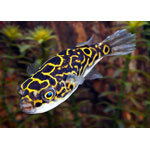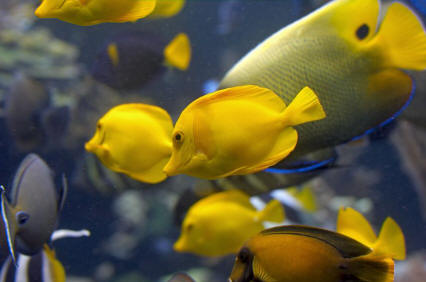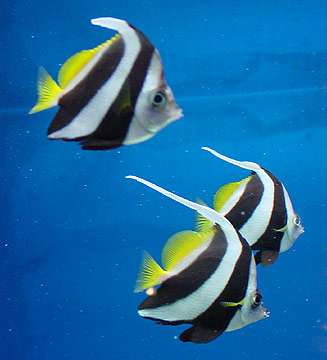Figure 8 Puffer

|
Scientific Name: Tetraodon biocellatus Price: Upon Request Origin: Asia: Indo-China, Indonesia, Malaysia, Thailand Family: Tetraodontidae NOT AVAILABLE NOW |
|
Other Names: Figure Eight Puffer, Eyespot Puffer fish, Palemba, Sumatra puffer |
|
Technical Info
Temperature: 24 - 28 ℃
pH: 6.5 - 7.5
GH: 5 - 12
Max size: 8 cm
Min Tank size: 70 Ltr
Position in Aqua: No special swimming level
Description
The Figure 8 Puffer is dark brown to green on the back with a white underside. These fish have many yellow lines and spots covering the backside of the fish, giving it an interesting look. Also there are a few black spots that are outlined in yellow on the tail, body and nose.
Food
Relishes all kinds of shellfish, as well as worms and other live and frozen foods. It should be fed snails and unshelled shellfish (such as crab legs, prawns etc.) regularly, in order to maintain its sharp teeth. As with other puffers, these grow continuously and become a problem for the fish if they're not kept ground down.
Breeding
Spawning occurs in brackish water. The eggs will be laid on the bottom, either on the substrate or on a flat rock. After the eggs are fertilized, the male will stay behind to guard them for approximately 7 days until the fry become waterborne.
Compatible with
Can be kept in a community tank, but caution should be exercised when choosing tankmates, as it tends to nip the fins of slow-moving or long-finned fish. In freshwater, it does well with fast-moving species such as characins, rasboras and barbs. In a brackish community tankmates can include monos, bumblebee gobies and salt-tolerant Chanda species. Although it will live in the company of conspecifics in a suitably large tank, studies have shown that specimens kept singly usually live much longer in captivity. If you want to keep more than one, try to buy at least four fish, so that any aggression is dissipated between the group
Note
hey are one of the few fish that can actually blink or close their eyes, which only serves to add further charm to what is already a fish with bags of character. They also have beak-like mouthparts, which are formed by a fusing of 2 teeth from each jaw (hence Tetraodon). These are used to crush shelled invertebrates, the favourite food of most puffers.

